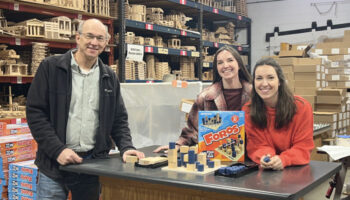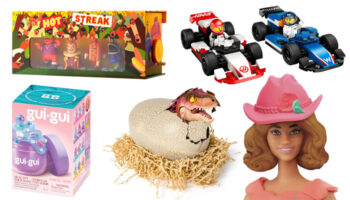Game designer Brett J. Gilbert on virtual playtesting, using agents and the origins of his new speed game, JigStars

Brett J. Gilbert is one of the UK’s most prolific and versatile game designers, with a portfolio spanning the likes of the Kennerspiel des Jahres-nominated Elysium to University Games’ quick-thinking card game, Rubik’s Match.
With a slate of upcoming games spanning FunSkool’s JigStars, Floodgate Games’ Vivid and ITB’s Junk Forts on the way, we caught up with Brett to find out how lockdown has impacted his design process.

Hey Brett! First off, let’s get the get the topic of lockdown and the pandemic out of the way; has all this changed or impacted how you ideate or pitch at all – for better or worse!?
It’s had a much bigger impact on the other parts of the process: prototyping and playtesting.
I’m no luddite, but I had not explored online platforms like Tabletop Simulator and Tabletopia before lockdown forced everyone into isolation. Virtual playtesting requires virtual prototypes and hence presented an entirely new learning curve to negotiate. But it’s an ill wind, and virtual prototyping definitely has its charms.
For one thing, there’s vastly less printing and cutting and gluing. And for another, it becomes much easier to change prototypes on the fly. Need another component? Just copy and paste.
There are compromises, too, of course: you completely lose any sense of the true physicality of the experience, and everything simply takes twice as long to play.
A virtual play space doesn’t suit every class of game, and there’s a risk that the platform’s quirks and limits constrict your own creativity — if all you have is a hammer, everything looks like nail, and all that! — but if you can navigate those limitations then you can get real work done.
And, absent all of the usual opportunities to pitch new ideas to publishers face to face, the virtual tabletop is all that remains. One should therefore be thankful for such small mercies!
We know from a recent interview with Becker Associates that you have a game called JigStars launching from FunSkool soon! Talk us through the game and where the idea came from?
JigStars is a speed game in which everyone tries to make the most colour matches by fitting the special jigsaw pieces together. It’s really very simple indeed — but that was the point: to make something immediate and familiar and tactile, that uses a physical element – the jigsaw piece – that everyone already understands. In this sense, JigStars is exactly what I set out to create: a “toy with rules”.
That was the approach vector: to think a little differently about how to conceptualise a game, and to apply that thinking to an existing paradigm, the jigsaw. It’s hardly a profound insight, but it was the seed from which JigStars blossomed.
Mind you, this was all a long time ago, and what’s sobering now is to reflect on how complex I chose to make the original game, how much simpler it eventually became, and therefore how much simpler it could have been from the very beginning.
Will I never learn?
Ha! Well you got there in the end! And this was pitched to Anjar & Becker Associates, who then placed it with FunSkool. Was using an agent a new experience and how did you find it?
I got the opportunity to meet with the Beckers at the Mojo Pitch event in 2019. I had never met with an agent before, so this was a completely new experience — and one that I was both a little skeptical and cautious about beforehand. But I was also excited to have my horizons broadened — and to find out more about a part of industry that felt very distant and very different from the comfy familiarity of hobby games.
It was a joy to meet the Beckers, who were keen to welcome me and put me at ease. And, ultimately, that unlikely meeting was hugely worthwhile. Without their enthusiasm for the JigStars concept it would never have escaped into the wild, let alone made it halfway round the world to be published by FunSkool in India. How incredible!

Absolutely, and looking elsewhere, I saw that you and Matthew Dunstan have a game out soon called Vivid; the artwork looks incredible and the theme sounds novel. Can you tell us a bit about it and where the idea behind it came from?
The core of the game that will be published by Floodgate Games as ‘Vivid’ in 2021 was a much older design of mine called ‘Sparkle’ — but it’s really only the very seed at the centre of that core that survives! Working with Matt, the concept morphed into something new entirely.
Floodgate have not yet released more than the — absolutely stunning! — cover art by Andrew Bosley, so I don’t think I should say anything too revealing, but at its heart the game has a very simple, very direct and hopefully very family-and-casual-gamer-friendly network-building concept, with a strong and colourful physicality.
The game’s simplicity and immediacy are, I think, two of the key attributes that attracted Floodgate to the concept, but since then they have worked very hard over the past 18 months to develop the idea and create a really whimsical and beautiful product around it.
We can’t wait to see the completed game revealed next year!
Neither can we! And looking ahead, what other games are due out soon from you and Matt that we should know about?
In addition to ‘Vivid’, 2021 will see the release of a slate of new co-designs that we are both eagerly looking forward to. It’s shaping up to be a great year for the ‘Dunstan & Gilbert’ partnership…

French publisher Ankama very recently announced ‘Nile Artifacts’ for release in early 2021, UK publisher Inside The Box announced ‘Junk Forts’, and Alley Cat Games, also based in the UK, will publish ‘Dice Hospital ER: Emergency Roll’, a roll-and-write companion to their successful and well-regarded 2018 release ‘Dice Hospital’.
Plus we have a truly wonderful game in production with Libellud, a new big-box game with AEG, and a top-secret project with Plan B. All amazing publishers; all with excellent reputations for top-notch development and production.
Great stuff, and one final question – and it’s a tough crystal-ball one – what do you think the impact of the pandemic will be on the game space? Do you see it changing the types of games that publishers look for, or the appetite for tabletop experiences at all?
There’s no doubt that we live in troubled and challenging times, so speculating on how a global health crisis has affected, and is likely to affect, the market for tabletop games may seem frivolous at best.
And yet play is vital — frivolous, too, but vital; escapist and absurd, of course, but no less necessary and profound. And there is every evidence that it is thriving; and that the untroubled, communal and implacably practical character of the humble board game continues to rise to meet that challenge and fulfil that promise.
Let’s hope so. A huge thanks Brett, always a pleasure to catch up.
—-
To stay in the loop with the latest news, interviews and features from the world of toy and game design, sign up to our weekly newsletter here
























